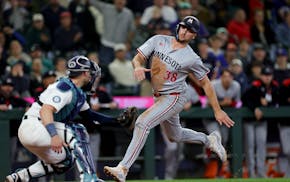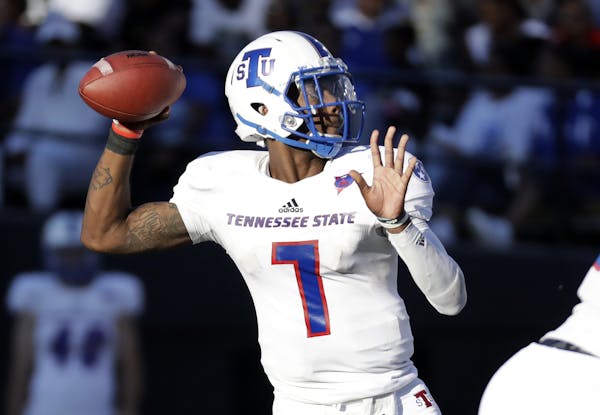Throughout training camp this month, Gophers coach P.J. Fleck has deviated from the sport's infamous two-a-day practices.
Instead of grinding his players into the ground with two strenuous practices a day, Fleck has flip-flopped between physical and mental days. That might mean a grueling night scrimmage followed by a noncontact, walk-through practice the next day.
The decision didn't come on a whim, either. The third-year Gophers coach — known for his high-energy, fast-paced practices — explained how the schedule is backed by science, namely the Catapult training system.
"I'm all about mind, body, spirit," Fleck said. "I've evolved as a coach as I've gone forward, especially with the youth of 2019. It's just different. I think this group can handle it, they're mature enough to handle it."
Catapult training compiles sports data and analytics using GPS trackers. The trackers are little chips inserted into the back of a vest players wear under their uniforms.
Fleck said the Gophers analyze multiple factors such as how fast a player runs in a game, the amount of effort required in conference games vs. nonconference games or how much exertion is required in a practice compared to a game.
"You're not pulling teeth, you're not you're not babysitting, you're not doing any of those things," Fleck said. "The guys out there this year, they want to play. They want to get better. They want to grow."
The result has been practices geared toward individual player goals. Different players have varying needs. During a noncontact session, the offensive and defensive linemen can take a physical break while keeping their minds sharp. The receivers and defensive backs can decipher formations and routes while taking the physical component out.
The training style is new to nearly everyone involved, including his coaches. Offensive coordinator Kirk Ciarrocca said he was initially skeptical, mainly about how the players would respond. But that changed once the players actually went through it.
"We're still getting the mental reps in there and straining them mentally at the same time," Ciarrocca said. "I've never been a part of a camp like this, really never seen it. It makes a lot of sense. I think it's really helping us."
As a head coach, Fleck has harped on how he strives to improve every year — his theme for his third year has been "work smarter, not harder." This adjusted routine of training camp is just his latest configuration.
The data isn't new. The Gophers utilized it in the past under former coach Jerry Kill, and many other sports teams also employ the technology. But it's how Fleck uses the information and implements it that is innovative. Many teams have the data but don't do anything with it, Fleck said, which is just as good as not having it.
Fleck said an imperative part of this plan is player buy-in. If the Gophers blow off the mental portions, practice for that day becomes useless. Thus far, Fleck said he's only seen one instance where there was a lull during camp, and it was addressed later.
"Our practices are running more efficient," Fleck said. "We're not doing a lot of things even different in our practice. It's just, it runs smoother, and it runs more efficiently."
If players take the schedule seriously it gives them the perfect balance between recovery while still working toward a goal. Defensive lineman Sam Renner said his body feels fresh, especially compared to some of the training camps he went through under past coaches.
For a position that constantly involves hitting, the extra rest is welcome. The redshirt senior said the Gophers have responded well, knowing exactly when to turn up the physicality during certain practices.
"Coming from two-a-days my first two years with Coach Kill was something that you make it through, but your body doesn't always feel that great," Renner said. "When you get to that first game, your legs are pretty dead."
At its core, football relies on repetition and the culmination of those reps being applied to games, Fleck said. By switching the focus between the physical or mental — or sometimes both — during a practice, the Gophers gain more productive practices.
"If you're not keeping up with the times," Fleck said, "and you're not changing, and you're not just adapting to what this particular team needs — then I think you're falling behind."
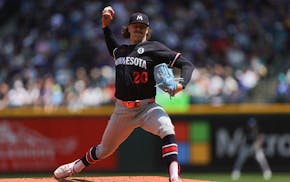
Twins let another ninth-inning rally go to waste, lose to Mariners on walk-off single
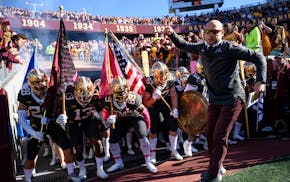
Two offensive tackles, linebacker are first to commit to Gophers in 'Summer Splash' weekend
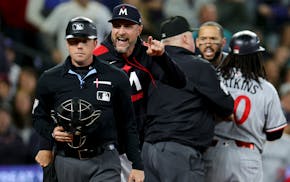
Twins' Correa ejected from on-deck circle, and he's not really sure why
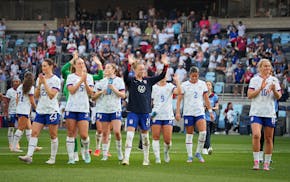
Neal: Girma returns to United States national team and rewards fans with her classiness
